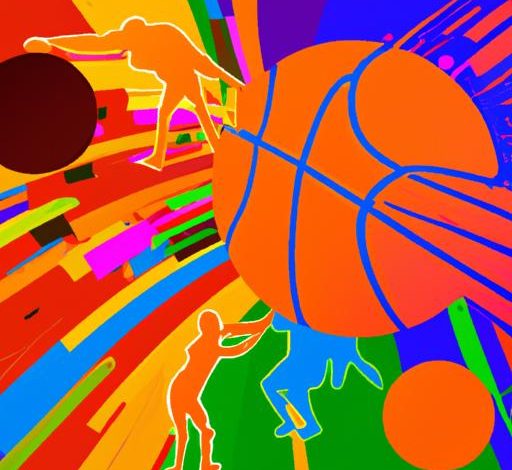History of Basketball at the Olympics: A Journey of Global Sporting Glory

Introduction
The Olympics, an event etched into the annals of sports history, has served as a magnificent stage for athletes worldwide to showcase their talents and compete on a global scale. Among the plethora of sports included in this grand spectacle, basketball stands tall as a captivating and fiercely contested discipline. In this article, we delve into the captivating history of basketball at the Olympics, tracing its footsteps from humble beginnings to its current status as a global sporting phenomenon.
Basketball’s inclusion in the Olympic Games stems from its rapid rise in popularity, captivating both players and fans alike. The fast-paced nature of the game, coupled with its unique blend of skill, strategy, and athleticism, made it a natural fit for the Olympic stage. Since its inception in the Olympics, basketball has evolved and grown, leaving an indelible mark on the world of sports.
Evolution of Olympic Basketball
Basketball’s journey at the Olympics began with its debut in 1936 during the Berlin Games. The inaugural tournament witnessed a modest participation of 23 teams, with the United States emerging as the first-ever Olympic basketball champions. This historic moment set the stage for the subsequent growth and evolution of the sport within the Olympic arena.
Over the years, Olympic basketball has undergone significant changes, adapting to the shifting landscape of the game. Notably, the inclusion of women’s basketball in 1976 brought about a new era of inclusivity and showcased the immense talent of female athletes on the Olympic stage. As the sport continued to gain traction, rules and regulations were refined, ensuring a fair and competitive environment for athletes from all nations.
Basketball, once considered a predominantly American sport, has now spread its wings globally, transcending borders and captivating audiences around the world. The rise of international basketball powerhouses such as the Soviet Union, Yugoslavia, and more recently, Spain and Argentina, has added a new dimension to the Olympic competition, elevating the level of play to unprecedented heights.
Through the years, Olympic basketball has witnessed awe-inspiring performances, iconic rivalries, and unforgettable moments etched in the memories of fans worldwide. From the “Dream Team” dominance of the United States in 1992 to the nail-biting showdowns between archrivals USA and the Soviet Union during the Cold War era, these moments have solidified basketball’s enduring legacy within the Olympic sphere.
Join me as we delve deeper into the rich tapestry of Olympic basketball history, exploring memorable moments, overcoming controversies, and envisioning the future of this captivating sport on the grandest stage of them all. In the next section, we’ll uncover the most memorable moments and legendary players that have left an indelible mark on the history of basketball at the Olympics.
Early Days of Olympic Basketball
A. Origins of Basketball and its Rapid Growth as a Sport
Basketball, a sport that has captured the hearts of millions, traces its origins back to the late 19th century in Springfield, Massachusetts, USA. Dr. James Naismith, a physical education instructor, invented the game as a way to keep his students active during the cold winter months. Little did he know that his creation would become a global sensation and find its way into the Olympic Games.
From its humble beginnings, basketball quickly gained popularity, spreading across the United States and beyond. Its fast-paced nature, combined with the simplicity of the rules, made it accessible to people of all ages and backgrounds. As the sport evolved, so did its fan base, with enthusiasts flocking to arenas to witness the thrilling action unfold.
B. Inclusion of Basketball in the Olympic Games
The recognition of basketball as an official Olympic sport came in the early 20th century. The International Olympic Committee (IOC) acknowledged the rising global significance of basketball and decided to include it in the Olympic program. This decision marked a monumental milestone for the sport, offering players the opportunity to compete on the world’s biggest sporting stage.
C. First Appearance of Basketball in the Olympics and its Reception
Basketball made its Olympic debut in the 1936 Berlin Games. The tournament, featuring 23 teams, showcased the immense talent and passion for the sport. The United States emerged victorious, claiming the first-ever Olympic basketball gold medal. The success of the tournament and the enthusiasm it generated among athletes and spectators laid the foundation for basketball’s continued presence in the Olympics.
While the introduction of basketball in the Olympics was met with excitement, it also faced its fair share of challenges. At the time, the tournament lacked the global representation seen today, with the majority of participants hailing from the United States and Europe. However, as the sport spread across continents, more nations began to embrace basketball, leading to a more diverse and competitive landscape in subsequent Olympic Games.
The early days of Olympic basketball laid the groundwork for the incredible journey that the sport would embark upon. As we move forward, we will explore the evolution of Olympic basketball, delving into the significant milestones and captivating moments that have shaped its history. Join me in the next section as we uncover the remarkable stories of Olympic basketball legends and the records they have set on the grandest stage of all.
Evolution of Olympic Basketball
A. Historical Milestones and Significant Moments in Olympic Basketball
Throughout its storied history, Olympic basketball has witnessed several milestones and unforgettable moments that have shaped the sport’s legacy. From historic victories to game-changing performances, these events have left an indelible mark on the Olympic stage.
One such milestone occurred in 1960 when the United States faced off against the Soviet Union in the gold medal match. In what would be remembered as one of the most controversial and thrilling basketball games in Olympic history, the United States emerged victorious with a close score of 81-57. This victory marked the seventh consecutive gold medal for the United States, solidifying their dominance in Olympic basketball.
Another defining moment came in 1992 when the United States assembled the “Dream Team” for the Barcelona Olympics. Comprised of basketball legends such as Michael Jordan, Magic Johnson, and Larry Bird, this star-studded squad showcased unparalleled skill and charisma, captivating fans worldwide. Their dominance on the court, along with their cultural impact, helped popularize basketball on a global scale, sparking a new era of international interest in the sport.
B. Introduction of Women’s Basketball in the Olympics
In a momentous step towards gender equality in sports, women’s basketball made its debut in the Olympic Games in 1976. This marked a significant milestone for women athletes, providing them with a platform to showcase their talent and compete at the highest level. Since then, women’s Olympic basketball has witnessed remarkable growth, with teams from various nations displaying exceptional skill, teamwork, and resilience.
One of the most notable teams in women’s Olympic basketball history is the United States. With an unparalleled record of success, the U.S. women’s basketball team has dominated the Olympic stage, winning multiple gold medals and showcasing the immense talent of female athletes. Other nations, including the Soviet Union and Australia, have also made their mark, contributing to the growth and global popularity of women’s basketball in the Olympics.
C. Changes in Rules and Regulations over the Years
As the sport of basketball has evolved, so too have the rules and regulations governing the game at the Olympic level. These changes have been implemented to ensure fair play, enhance competitiveness, and adapt to the dynamic nature of the sport.
One significant change occurred in 1992 when the International Basketball Federation (FIBA) allowed professional players to participate in the Olympics. This decision paved the way for the inclusion of NBA superstars in the Olympic basketball tournament, elevating the level of competition and captivating audiences worldwide.
Additionally, FIBA has made adjustments to the game’s rules to promote fairness and enhance the spectator experience. Notable changes include the introduction of the three-point line in 1984 and the implementation of a shot clock, which added a new dimension of strategy and excitement to Olympic basketball.
In the next section, we will delve into the most memorable moments and legendary players in the history of Olympic basketball, exploring the impact they have had on the sport’s popularity and global influence.
Memorable Olympic Basketball Moments
A. Notable Players and Teams in Olympic Basketball History
Throughout the history of basketball at the Olympics, numerous players and teams have left an indelible mark on the sport, etching their names in the annals of Olympic history. One such team is the legendary “Dream Team” of 1992, comprising basketball icons like Michael Jordan, Magic Johnson, and Larry Bird. Their unparalleled dominance captivated the world and showcased the immense talent within the United States.
Similarly, the Soviet Union’s basketball dynasty during the 1970s and 1980s stands as a testament to their prowess on the Olympic stage. Led by stars like Aleksandr Belov and Sergei Belov, the Soviet team secured multiple gold medals, engaging in intense battles with their American counterparts that would go down in history as some of the most memorable Olympic basketball showdowns.
Individually, players like Michael Jordan, who captivated audiences with his gravity-defying leaps and clutch performances, and the towering presence of Yao Ming, who became a global basketball ambassador for China, have left an enduring impact on the Olympic basketball landscape.
B. Legendary Performances and Records Set in Olympic Basketball
The Olympic stage has witnessed awe-inspiring performances that have transcended the boundaries of the sport. In 1972, the Munich Games witnessed a dramatic showdown between the United States and the Soviet Union, with controversy surrounding the final seconds of the gold medal match. This moment became etched in Olympic history as one of the most contentious and debated basketball games ever played.
Records have been shattered and milestones achieved during Olympic basketball competitions. In 2012, the United States women’s basketball team, led by the likes of Diana Taurasi and Sue Bird, secured their fifth consecutive gold medal, establishing an unprecedented era of dominance. Additionally, in 2016, the United States men’s basketball team clinched their third consecutive gold medal, showcasing their continued excellence on the Olympic stage.
C. Impact of Olympic Basketball on the Sport’s Popularity Worldwide
Olympic basketball has played a pivotal role in propelling the sport’s popularity to new heights on a global scale. The Olympic Games provide a platform for athletes from diverse backgrounds to showcase their skills, fostering international camaraderie and promoting the spirit of competition.
The triumphs and struggles witnessed in Olympic basketball have captured the imaginations of fans worldwide, elevating the sport’s global appeal. The Olympic stage serves as a catalyst for expanding the reach of basketball, inspiring aspiring athletes, and driving the growth of the sport in both traditional and emerging basketball nations.
With each edition of the Olympics, basketball’s popularity surges, captivating audiences and nurturing a new generation of fans. The impact of Olympic basketball extends far beyond the games themselves, resonating in communities around the world and leaving an indelible legacy on the sport’s global landscape.
As we move forward, let’s explore the controversies and challenges that have shaped the history of basketball at the Olympics, shedding light on the trials and tribulations faced by the sport on its journey to Olympic glory.
Controversies and Challenges in Olympic Basketball
A. Political Controversies Affecting Olympic Basketball
The intersection of sports and politics has often led to contentious moments in the history of Olympic basketball. The Cold War era, in particular, witnessed intense rivalries and political tensions that spilled onto the basketball court. The United States and the Soviet Union, the two superpowers of that time, engaged in fierce battles for Olympic supremacy, with each victory carrying a symbolic weight beyond the realm of sports. The controversial 1972 Munich Olympics basketball final between the United States and the Soviet Union stands as a stark example. The game ended in a highly disputed finish, leaving a bitter taste and sparking debates about fair play and political influence.
B. Doping Scandals and Their Impact on the Sport
Doping scandals have plagued various sports, and Olympic basketball has not been immune to their effects. The use of performance-enhancing substances not only tarnishes the integrity of the competition but also undermines the trust between athletes and fans. The Balco scandal in 2004, which implicated several high-profile basketball players, brought the issue of doping to the forefront of Olympic basketball. Such scandals have prompted stringent anti-doping measures and a renewed commitment to fair play and clean competition.
C. Challenges Faced by Countries in Terms of Talent Development and Competition
While Olympic basketball showcases the finest talents from around the world, not all nations have an equal footing when it comes to talent development and competition. Limited resources, lack of infrastructure, and geopolitical factors can pose significant challenges for countries striving to compete at the highest level. However, the Olympic spirit of inclusivity and fair play has paved the way for initiatives such as basketball development programs and international collaborations aimed at nurturing talent and bridging the gap between nations. These efforts aim to create a more level playing field and ensure that every country has a fair opportunity to excel in Olympic basketball.
As we navigate through the complexities and controversies surrounding Olympic basketball, it is essential to recognize the resilience of the sport and the continuous efforts to address these challenges. In the next section, we will explore the future of Olympic basketball, examining the current trends and potential innovations that lie ahead.
Future of Olympic Basketball
The future of Olympic basketball holds immense promise and potential as the sport continues to evolve and captivate audiences around the world. With each Olympic cycle, basketball showcases its ability to adapt, innovate, and embrace new horizons.
Current Trends and Developments
In recent years, the globalization of basketball has been a key trend in Olympic competition. The participation of diverse countries and the rise of international talent have brought a refreshing level of competitiveness and unpredictability to the games. No longer can one rely solely on traditional powerhouses to dominate the Olympic basketball stage, as emerging nations continue to make their mark.
Moreover, advancements in technology and sports science have revolutionized the way athletes prepare and compete. From cutting-edge training techniques to data analytics, these developments have the potential to enhance player performance and create a more thrilling and dynamic Olympic basketball experience.
Potential Changes and Innovations
As the world evolves, so does the landscape of Olympic basketball. Discussions surrounding potential changes and innovations are constantly underway, aiming to enhance the sport’s appeal and maintain its relevance in a rapidly changing sporting landscape.
One area of potential change is the format of the tournament itself. Some propose expanding the number of teams to increase participation and create more opportunities for athletes from a wider range of nations. This would not only foster global inclusivity but also provide a platform for emerging basketball talents to showcase their skills on the Olympic stage.
Another aspect that may be subject to change is the inclusion of new events or variations of the sport. The introduction of three-on-three basketball in the 2020 Tokyo Olympics, for instance, added a fresh and exciting dimension to the basketball program. Such innovations help cater to evolving audience preferences and inject new energy into the sport.
Outlook on Growth and Global Impact
Looking ahead, the growth and global impact of Olympic basketball are poised to continue on an upward trajectory. The sport’s ability to transcend boundaries and unite people from diverse cultures and backgrounds remains a powerful force. As more nations invest in basketball infrastructure, talent development, and grassroots programs, the pool of skilled players will expand, further fueling the growth of the sport.
Moreover, the popularity of basketball extends far beyond the Olympic Games. The NBA’s global reach, the success of international leagues, and the rise of social media platforms have contributed to a surge in basketball fandom worldwide. This heightened interest translates into increased viewership and engagement during the Olympic basketball competitions, amplifying the sport’s impact and ensuring its enduring relevance.
In conclusion, the future of Olympic basketball shines brightly, brimming with possibilities and excitement. As the sport continues to captivate and inspire, we eagerly anticipate the next chapter in the history of basketball at the Olympics, where legends will be born, rivalries will be rekindled, and the spirit of competition will flourish on the grandest stage of them all.
Conclusion: So above is the History of Basketball at the Olympics: A Journey of Global Sporting Glory article. Hopefully with this article you can help you in life, always follow and read our good articles on the website: Asian Wallpaper




